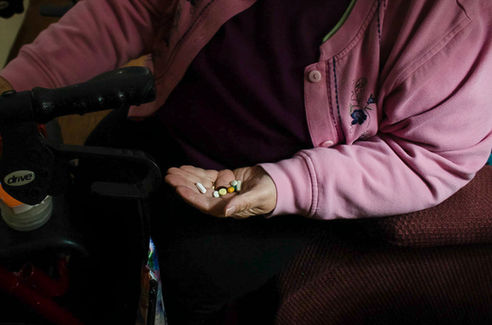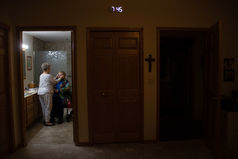Aurora Rae
Visual Storytelling
Pinky and Blinky's Fight
By Aurora Rae

Twins, 77, fight Parkinson's through Rock Steady Boxing in Midland:
"She needs me and I need her"
By Aurora Rae
Identical twins Marge Williams and Elaine Embrey, 77, have naturally been by each other’s side since day one. For most of their lives, they have dressed alike, talked alike and thought alike.
But in 2016, they learned of something they both had in common that identical twins do not frequently share: Parkinson’s Disease (PD), a progressive nervous system disorder that affects movement.
Research has shown that PD is rare in identical twins. A study by the National Center for Biotechnology Information found the consistency rate in identical, or monozygotic, twins to be 11%.
Having spent their lives in the heavy agriculture and chemical industry of the Midland/Bay City/Saginaw region, Marge and Elaine wonder about the effect their surroundings have had on their health.
Washington University in St. Louis (WUSTL) released a study identifying the prevalence of PD in the United States based on 36 million Medicare recipients. The study found higher rates in the Midwest and Northeast.
“These are the two regions of the country most involved in metal processing and agriculture, and chemicals used in these fields are the strongest potential environmental risk factors for Parkinson’s Disease that we’ve identified so far,” said Allison Wright Willis, M.D., assistant professor of neurology at WUSTL School of Medicine.
Growing up
Born on March 22, 1944, Marge and Elaine grew up together in a four-bedroom, one-bathroom Bay City home filled with 10 family members, including their parents, grandma, uncle and siblings.
They spent their childhood together all the way through graduate school at St. Mary’s Hospital School of Nursing in Saginaw – now a cancer treatment center – where they obtained their diplomas in nursing on June 20, 1965.
Afterward, both were hired by St. Mary’s Hospital; Elaine worked in the intensive care unit and Marge in the newborn nursery.
“We did not get summers off,” Elaine said. “We went around the year with a few weeks off during the year.”
They eventually moved back home with their parents and three brothers until Marge married her husband, Jim, on Sept. 11, 1965, and Elaine married her husband, Ron, almost exactly one year later on Sept. 10, 1966.
Elaine and her husband lived in Bay City for almost three years before moving to nearby Essexville. They eventually built a home there and raised three children. The two relocated back to Bay City over two decades later.
After Marge and her husband wed, they stayed in Bay City, built their first home and began to raise a family. When Marge was pregnant with her fifth son, they moved into a larger home in Essexville as well.
“Two years later, we became parents to our only daughter,” Marge said.
Becoming neighbors
In 2005, Marge lost her husband to complications of diabetes, with which he had been diagnosed 30 years earlier. She continued to live in their home for a few years afterward.
“My husband did not want to move out of his home,” she said. “He loved it there in Essexville.”
In 2008, Elaine and her husband moved into her current condo in Bay City. Elaine was diagnosed with breast cancer three months later.
Shortly afterward, the condo next door to Elaine and her husband in the Shadows on the Green became available.
“I talked Marge into selling her house in Essexville and buying the condo next door to me and my husband,” Elaine said.
“It just made it easier for us,” Marge added. “It just made sense.”
'The first time since college'
In 2014, Elaine’s husband died of multiple myeloma.
Four years later, Marge sold the condo next door to Elaine and the two began living together for “the first time since college."
“It feels so normal now,” Elaine said.
Relieved to have an answer
Around the time her husband died, Elaine noticed her body acting differently than normal.
Her handwriting “became very, very tiny” and her legs very weak. She lost her sense of smell and at times had trouble holding things like a fork and toothbrush.
“I thought it was because I was taking care of my husband when he was dying,” she said. “I was neglecting myself and so I thought I was just deconditioned from not getting enough exercise.”
She started to work out 30 minutes each day and “that helped some,” but her weakness persisted.
“I would get down on the floor to get something out of the cupboard, and I could hardly get back up again,” she said. “I thought, ‘What is going on?’”
Prior to her diagnosis, she was prescribed Carbidopa/levodopa for restless leg syndrome – which coincidentally is the “most effective drug to treat PD,” according to the Parkinson’s Foundation.
Her doctor suspected PD, but wanted a neurologist to officially diagnose her condition.
On January 27, 2016, Dr. Gregory Dardas, M.D., at Memorial Healthcare Institute for Neuroscience, confirmed she had PD. Embrey said she felt relieved to have an answer.
“At least, I knew why I was feeling the way I was feeling,” she said.
Finding a fighting family
A few months later, one of Elaine’s nurse friends sent her a Midland Daily News article about a soon-to-open local gym in Midland dedicated to people with PD.
“I called Stacey and joined before it was officially opened,” Elaine said.
Stacey Hitsman, owner and head coach of Michigan’s fourth Rock Steady Boxing (RSB), welcomed Elaine in May 2016, along with six other “fighters,” as they call themselves.
All the fighters at Rock Steady are given nicknames – Elaine was named"Pinky," honoring her fight against breast cancer a decade prior.
Hitsman said the biggest takeaway participants have from their time at RSB is the camaraderie.
“They feel like they are in a safe, secure location with others that understand them,” she said. “The friendships and the support that grows from that is what then drives them to come to class.”
Elaine echoed Hitsman, saying the few members she met upon joining – and those she sees daily now – are much more than just workout partners.
“It’s kind of like a support group in itself,” she said. “It just gave you a bond to know that other people were dealing with the same thing that you were. Some were going faster than the others, but it was still the same disease and we all understood each other and supported each other.”
Another diagnosis
While Elaine was moving forward with a long-awaited diagnosis and newfound community, Marge was having her own health issues. Similar to Elaine, she had been prescribed Carbidopa/levodopa for restless leg syndrome as well as hand tremors.
Elaine suspected Marge had PD – especially when she was switched to another medicine and her tremors returned – but the first doctor Marge saw “wouldn’t diagnose” her.
On November 15, 2016, Marge was relieved when her doctor confirmed what she and Elaine were nearly certain of.
“I went to Dr. Dardas, and he diagnosed me (with PD) and he put me back on the Carbidopa and that took away my tremors,” she said.
Marge said she was able to connect experiences from many years ago, like loss of smell, to symptoms of PD.
“I would change a diaper, and everybody would be gagging,” she recalled. “I didn’t smell that.”
Exactly 13 days after her official diagnosis, Marge joined the Rock Steady Boxing family.
“I was kind of waiting to be a part of it,” she said. “I just wanted to be diagnosed so they could start doing something to help.”
She was nicknamed "Blinky" because a lack of blinking is a common symptom of PD and because it coincidentally rhymed with her sister's nickname, Pinky.
An increasing need for care
Since she moved in with Elaine, Marge’s health has declined slowly, but Elaine said it is not so much due to PD but rather other comorbidities, like arthritis and discitis.
Marge has been hospitalized twice since 2019, each time followed by a two- or three-month rehab stay.
“The second time, she not only moved back into my condo, but I moved her into my bedroom with me so that I can keep a closer eye on her,” Elaine said.
Marge now uses a walker and “needs help with everything,” like showering, dressing and getting ready, according to her sister, who has become her full-time caregiver.
“As she loses strength, I have to be aware of that and help her more than usual, but then encourage her to do what she can,” said Elaine, who also does all the driving to places like Rock Steady, restaurants, doctor appointments, and church.
Marge has tried a variety of treatments, including acupuncture and physical therapy, to help her symptoms subside.
“I want to get to walk better than what I’m walking now,” Marge said.
Her doctor recommended she try one thing at a time “so that if I’m seeing an improvement, I’ll know which one is giving me improvement,” she said.
In Elaine and Marge’s shared bedroom are two side-by-side twin beds.
Sometimes, they scream in their sleep – a symptom of PD – so sleeping next to each other enables them to wake one another up in the night if and when that happens.
Elaine had modifications set up in their home, including a wooden ramp in the garage and an electric chair to assist Marge up and down the basement stairs.
RSB has made an immeasurable difference
Despite the symptoms and side effects, Hitsman feels Rock Steady Boxing has helped both the twins immeasurably.
“The ability to be now six years out, still living independently… all of her social obligations haven’t waned at all," Hitsman said of Elaine. "And without her working out this entire time, she couldn’t say that."
Hitsman said Elaine was on the cusp of osteoporosis – bone loss due to weakness – for decades. But RSB helped her get rid of that.
“It’s from punching and jumping, all that impact has made her bone strength 30%,” Hitsman said. “She’s gained 6% bone density and she’s no longer osteopenic.”
Since Elaine has become Marge’s caregiver, Hitsman said she is mindful to monitor Elaine and ensure that she is taking adequate care of herself.
Hitsman said the goal with Marge has been to keep her living at home and using an assistive device even though her disease is progressing faster and is coupled with other illnesses.
She said Marge would not be able to maintain like she has – and even improve – had it not been for RSB.
“She came in with a walker, and then we got her to where she could be independent with a cane, and then it got to the point where she didn’t need a cane,” Hitsman said.
She said the twins, Elaine especially, have become “ambassadors” for RSB.
“(Elaine’s) kind of like our welcome committee, telling people how much it has helped her and then welcoming people into the gym and conversing with them and stuff," Hitsman enthused.
'She needs me, and I need her'
Marge needs Elaine physically, but they both rely on each other emotionally.
“Since we’re so much alike, when we’re going through a tough time, we totally understand each other and the pain we're going through,” Elaine said. “Just talking about it helps because we understand each other so easily.”
The twins have developed a deeper gratitude for each other because of how they help one another.
“(Marge) probably thanks me 100 times a day,” Elaine said.
“Cause she’s doing 100 things a day for me,” Williams responded.
No matter what the twins are faced with, they know they have a unique bond – and need each other deeply.
“You just can tell that she needs me, and I need her,” Embrey said.
Published in the Midland Daily News
Awarded Michigan Press Photographers Association, Feature Picture Story Honorable Mention








